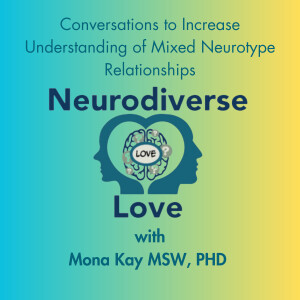
Neurodiverse Love with Mona Kay
Society & Culture:Relationships

The Impact of Sexual Shame and How We Can Begin to Heal-Dr. Tina Schermer Sellers
 2023-12-26
2023-12-26
You can buy a digital deck of the "Neurodiverse Love Conversation Cards", or the recently released "Neurodiverse Love Conversation Card Workbook" at: www.neurodiverselove.com. On the Neurodiverse Love website you can also subscribe to the Neurodiverse Love newsletter, or get more information about the support groups that Mona facilitates for neurodiverse couples, or the neurotypical/non-autistic partners. Thank you for being part of the Neurodiverse Love community! ________________________________________________________ Dr. Tina Schermer Sellers is a certified sex therapist and supervisor and also a Licensed Marriage and Family Therapist (LMFT). She is the author of two books and also teaches graduate courses in human sexuality. Dr. Tina also leads the Northwest Institute on Intimacy (https://www.nwioi.com) where she trains therapists, physicians, and educators on sexual health. During this episode, we talk about the history of sexual shame and how to heal it.
We also discuss other topics that many neurodiverse couples may be dealing with related to physical and sexual intimacy. Those topics include:
- Being relationally and sexually healthy.
- The history and definition of sexual shame.
- How does sexuality look for diverse populations?
- Only 18 states require medically accurate sex education.
- The impact of silencing and shaming someone for being sexually curious.
- Understanding your internal critic and internalized judgment and the source of sexual dysfunction.
- Ways to heal from sexual shame.
- What was the misinformation you may have received about sex?◦ How can we be comfortable in our own skin related to physical and sexual intimacy?
- When something that is pleasurable to you doesn’t seem common.
- Understanding consent, support and how you maintain both.
- Experiencing pleasure in the way that works for each of you.
- Feeling othered doesn’t mean there is something wrong with you.
- Bring your less reactive self to the conversation about what you like. Find people who share your interests.
- Partners can mirror back to each other the things that are most important.
- Is there a bridge to each other around areas of significant difference?
- Exploring the possibility of opening up your relationship regarding getting your needs made in different ways.
- How misunderstandings regarding needs can create struggles with physical and sexual intimacy.
- Lack of knowledge and feeling you don’t deserve something better can cause you to give up.
- Sex may have been routine and may not include a lot of communication.
- High desire person may not be getting the heart connection and pleasure they want.
- Penetrative sex is not the only type of sex.
- Research has shown that many queer couples are having better sex.
- Can you and your partner create a menu of what you each like?
- Mojoupgrade.com has a quiz regarding sexual interests and preferences.
- When one partner wants to engage in watching pornography and the other partner is confused.
- Understanding the role of pornography and why it’s in your partner’s life.
- Understand why your partner may feel betrayed.
- Porn does not give you intimacy.
- Gain an understanding of when your partner started looking at porn, what was the purpose, what does it help with, what does it get in the way of, and how can you build a sexual health plan together.
- Pinklabel.tv; Erikalust.com (suggested sites for ethical porn)
- Center for Sexual Pleasure and Health (https://weknowship.org/)
- Any act of loving is an act of risk. Your partner may disappoint you and/or break your trust.
- Have reasonable expectations and determine how each of you want to manage the bumps in the road of your relationship.
- Are you both willing to work to become a better version of yourself on the other side of your challenges?
You can contact Dr. Tina at: www.TinaSchermersellers.com
or you can follow her or the Northwest Institute on Instagram: @Drtinashameless or @Nwinstituteonintimacy
--- Support this podcast: https://podcasters.spotify.com/pod/show/neurodiverse-love/supportMore Episodes
Create your
podcast in
minutes
- Full-featured podcast site
- Unlimited storage and bandwidth
- Comprehensive podcast stats
- Distribute to Apple Podcasts, Spotify, and more
- Make money with your podcast
It is Free
- Privacy Policy
- Cookie Policy
- Terms of Use
- Consent Preferences
- Copyright © 2015-2024 Podbean.com





